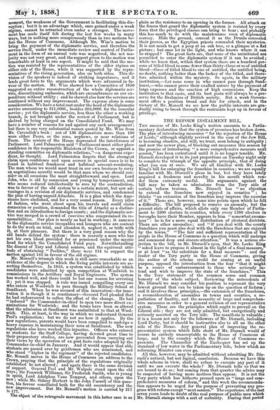EXCLUSION GIVING WAY.
Tan great public interests are forcing .their way notwithstand- ing the encrusted resistance of the privileged classes. For the moment, the weakness of the Government is facilitating this dis- ruption; but it is an advantage which, once gained under a weak regime cannot be retracted even under a stronger. The move- ment lies made itself felt during the last few weeks in many ways, but in nothing more conspicuously than in two motions be- fore the House of Commons. Although Mr. Wise's motion to bring the payment of the diplomatic service and therefore the service itself, under the immediate review arid control of Parlia- ment in the form of an annual vote was negatived, the net ma- jority was not very great, and the support given to the motion was remarkable at least in one aspect. It might be said that the mo- tion was resisted by the representatives of the older regime on either side of the House, while it was supported by the repre- sentatives of the rising generation also on both sides. This i- Mr. Monsell's triumph this week is still more remarkable as an evidence otthe degree to which the living public interests are as- serting themselves. In 1855, a system was established by which candidates were admitted by open competition at Woolwich to commissions in the Artillery and Royal Engineers. The system has worked well, and there could be but one reason for arresting it ; yet it was stopped. A rule was issued compelling every one who enters at Woolwich to pass through the Military School at Sandhurst. When he was accused of this innovation—for inno- vation it is though it is reactionary—General Peel pleaded that he had endeavoured to soften the effect of the change. He had "induced" the Commander-in-chief to open two more direct ex- aminations for Woolwich; and the terms have been so altered that the admission at Sandhurst was assimilated to that at Wool- wich. This, at least, is the way in which we understand General Peel's explanation; but we do not see how it applies. By the new regulations, parents would have been compelled to undergo a heavy expense in maintaining their sons at Sandhurst. The new regulations also have worked this injustice. Officers who entered as students for the Staff College, having devoted great time to their preparatory studies, are now prevented from carrying out their views by the operation of ex,post facto rules adopted by the Commander-in-chief in January. And it would appear that able students are passed over by gentlemen who are nominated, aad who stand "higher in the regiment" of the rejected candidates. Mr. Monsen moves in the House of Commons an address to the Crown, praying that the principle of the regulations originally established be not altered ; and again there is the same division of support. General Peel and Mr. Walpole stand upon the old Ways; Sir Fenwick Williams, Sir Frederick Smith, who is young in spirit, Lord Adolphus Vane Tempest, and others, upon the new ; while Mr. Sidney Herbert is the John Russell of this ques- tion, his favour conciliated both for the old ascendancy and the
new improvement. But Mr. Monsell's motion is carried by 217 to 177. • The object of the retrograde movement in this latter case is as
plain as the resistance to an opening in the former. All attack on the fences that guard the diplomatic system is resisted by every force that the privileged classes can bring to bear ; and probably this has much to do with the maintenance even of diplomatic secrecy. Hide the ground, conceal it as the Druids concealed their groves, as the Egyptian priests concealed their mysteries. It is not much to get a peep at an oak tree, or a glimpse at a fiat picture ; but once let in the light, and who knows where it can be stopped ? The great facts are, that none of the uninitiated are permitted to enter the diplomatic system if it can be avoided; while we know that, within that system there are a hundred per- sons of titled blood to some fewer than thirty-three or so of untitled blood—three of titled blood to one of untitled, the untitled being, no doubt, nothing better than the lackey of the titled, and there- fore admitted within the mystery. So again, in the military institution,—Let none come in who cannot pass through Sand- hurst,—who cannot prove their exalted nature by the payment of large expenses and the sanction of high connexions. Keep the institution to that caste, and its best posts will always be a pre- serve for the Brahmins of British society. But a weak Govern- ment offers a position broad and fair for attack, and in the victory of Mr. Ifonsell we see how the public interests are gra- dually rising to break through the restraints kept up in favour of privilege.



































 Previous page
Previous page